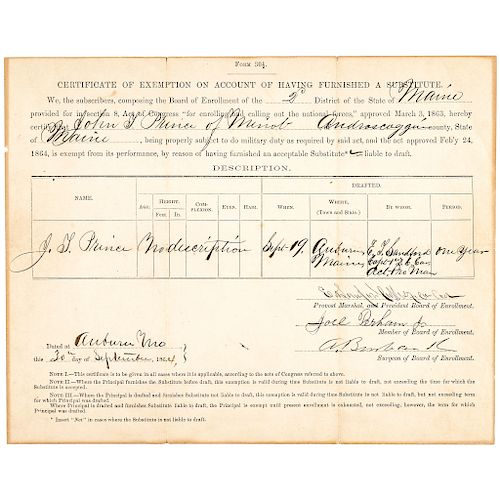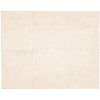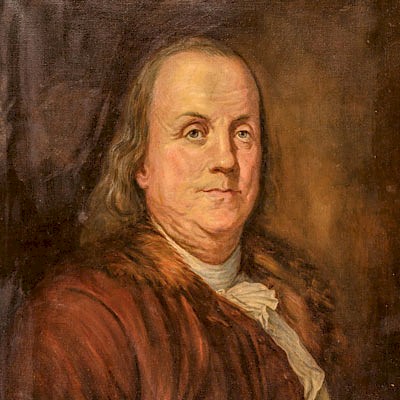1864 Civil War Military Certificate of Exemption having Furnished a Substitute!
Lot 222
Estimate:
$600 - $800
Absentee vs Live bid
Two ways to bid:
- Leave a max absentee bid and the platform will bid on your behalf up to your maximum bid during the live auction.
- Bid live during the auction and your bids will be submitted real-time to the auctioneer.
Bid Increments
| Price | Bid Increment |
|---|---|
| $0 | $10 |
| $200 | $20 |
| $300 | $25 |
| $500 | $50 |
| $1,000 | $100 |
| $2,000 | $200 |
| $3,000 | $250 |
| $5,000 | $500 |
| $10,000 | $1,000 |
| $20,000 | $2,000 |
| $30,000 | $2,500 |
| $50,000 | $5,000 |
| $100,000 | $10,000 |
| $200,000 | $20,000 |
| $300,000 | $25,000 |
| $500,000 | $50,000 |
About Auction
By Early American History Auctions
Aug 24, 2019
Set Reminder
2019-08-24 12:00:00
2019-08-24 12:00:00
America/New_York
Bidsquare
Bidsquare : Autographs, Colonial Currency, Political Americana, Historic Guns
https://www.bidsquare.com/auctions/early-american-history-auctions/autographs-colonial-currency-political-americana-historic-guns-4347
Historic Autographs • Colonial Currency • American Civil War Colonial Era • Revolutionary War • Political Americana • Black History Early American History Auctions auctions@earlyamerican.com
Historic Autographs • Colonial Currency • American Civil War Colonial Era • Revolutionary War • Political Americana • Black History Early American History Auctions auctions@earlyamerican.com
- Lot Description
Civil War Union Documents
Rare 1864 Partly-Printed Military "Certificate of Exemption on Account of having Furnished a Substitute." In Civil War
September 30, 1864-Dated Civil War Period, Partly-Printed Document, "Certificate of Exemption on Account of having Furnished a Substitute." FORM 30 1/2. Auburn, Maine, Choice Very Fine.
This original, fully completed Civil War Period, Partly-Printed Document measures about 8" x 10", 1 page, printed in black on clean wove period paper. Being an official, fully executed and complete, "Certificate of Exemption on Account of having Furnished a Substitute." Made to John T. Prince of Minot, Maine who provided a Substitute in his place, so he didn't have to fight having been drafted by the Union Army. Transmittal folds, extreme outer edge tone, boldly completed having stated "No description" for J. T. Prince. Document lists reasons the Substitute is liable or "Not" liable to draft. The first of this remarkable and important Civil War draft Substitute form we have seen and offered. Or, for $300 in Cash Paid or otherwise by providing a worthy "Substitute," the drafted men who could afford to pay were allowed to buy their way out of military service and harms way!
The Enrollment Act, 12 Stat. 731, enacted March 3, 1863, also known as the Civil War Military Draft Act, was legislation passed by the United States Congress during the American Civil War to provide fresh manpower for the Union Army. A form of conscription, the controversial act required the enrollment of every male citizen and those immigrants who had filed for citizenship between ages twenty and forty-five.
Federal agents established a quota of new troops due from each congressional district. In some cities, particularly New York City, enforcement of the act sparked civil unrest as the war dragged on, leading to the New York City draft riots on July 13-16. It replaced the previous Militia Act of 1862.
The policy of substitutions was continued throughout the war. The problem with substitution was that it provided substitutes with powerful incentives to desert soon after enlisting. Career "jumpers" made a living off of enlisting as a substitute, collecting their compensation, deserting before their units were dispatched to the front, and repeating the process. The problem was well known to the military commanders who regularly saw the same recruits repeatedly. In addition, troops furnished by substitution were considered to be of an inferior quality in comparison to regulars and volunteers.
Congress passed an amendment to the Enrollment Act in 1864. Section 5 limited the length of an exemption from the draft by payment of a commutation fee to One year. Then, those drafted were required to serve or to furnish substitutes.
Commutation (paying $300 to escape the draft - $300 being equivalent at the time to approximately $50,000 earned by an unskilled worker in 2018) was created in an effort to keep substitution prices low. If commutation were not instated, the price of a substitute would have quickly soared past $300. Also, commutation was intended to raise money for the war effort. While commutation raised war funds, it was often a criticism of the draft that it was better at raising money than troops. The rationalization for commutation was that unwilling troops were ineffective so the government might as well extract funds from the unwilling if it got poor service. Despite the good intentions behind commutation, it was one of the most hated policies of the war.
- Shipping Info
-
Early American provides in-house worldwide shipping. Please contact us directly if you have questions about your specific shipping requirements.
-
- Buyer's Premium



 EUR
EUR CAD
CAD AUD
AUD GBP
GBP MXN
MXN HKD
HKD CNY
CNY MYR
MYR SEK
SEK SGD
SGD CHF
CHF THB
THB












